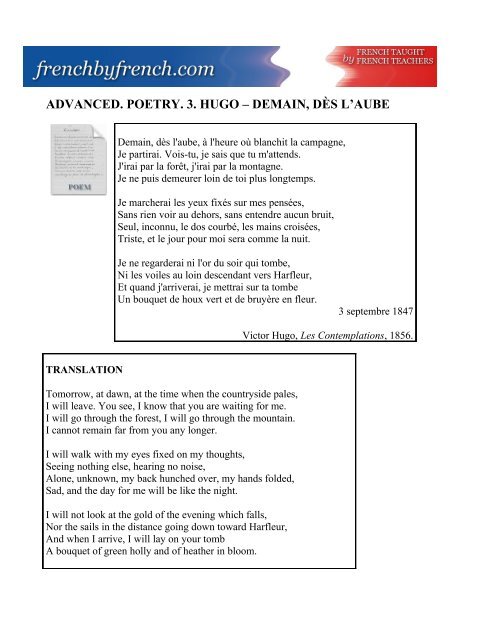Victor Hugo - Demain, dès l'aube - Frenchbyfrench
Victor Hugo - Demain, dès l'aube - Frenchbyfrench
Victor Hugo - Demain, dès l'aube - Frenchbyfrench
Create successful ePaper yourself
Turn your PDF publications into a flip-book with our unique Google optimized e-Paper software.
ADVANCED. POETRY. 3. HUGO – DEMAIN, DÈS L’AUBE<br />
TRANSLATION<br />
<strong>Demain</strong>, <strong>dès</strong> <strong>l'aube</strong>, à l'heure où blanchit la campagne,<br />
Je partirai. Vois-tu, je sais que tu m'attends.<br />
J'irai par la forêt, j'irai par la montagne.<br />
Je ne puis demeurer loin de toi plus longtemps.<br />
Je marcherai les yeux fixés sur mes pensées,<br />
Sans rien voir au dehors, sans entendre aucun bruit,<br />
Seul, inconnu, le dos courbé, les mains croisées,<br />
Triste, et le jour pour moi sera comme la nuit.<br />
Je ne regarderai ni l'or du soir qui tombe,<br />
Ni les voiles au loin descendant vers Harfleur,<br />
Et quand j'arriverai, je mettrai sur ta tombe<br />
Un bouquet de houx vert et de bruyère en fleur.<br />
Tomorrow, at dawn, at the time when the countryside pales,<br />
I will leave. You see, I know that you are waiting for me.<br />
I will go through the forest, I will go through the mountain.<br />
I cannot remain far from you any longer.<br />
I will walk with my eyes fixed on my thoughts,<br />
Seeing nothing else, hearing no noise,<br />
Alone, unknown, my back hunched over, my hands folded,<br />
Sad, and the day for me will be like the night.<br />
I will not look at the gold of the evening which falls,<br />
Nor the sails in the distance going down toward Harfleur,<br />
And when I arrive, I will lay on your tomb<br />
A bouquet of green holly and of heather in bloom.<br />
3 septembre 1847<br />
<strong>Victor</strong> <strong>Hugo</strong>, Les Contemplations, 1856.
<strong>Victor</strong> <strong>Hugo</strong> (1802 – 1885) is a French writer. He’s as famous for his<br />
poetry as his theater, his essays or his novels.<br />
He was a key figure in the Romantic movement in France. He’s also<br />
known for being an engaged artist who had to go into exile because of<br />
his writings.<br />
As a novelist, he wrote very famous books such as Notre Dame de<br />
Paris (1831), Les Misérables (1862).<br />
As a poet, he wrote Les Châtiments (1853), Les Contemplations<br />
(1856) or La Légende des siècles (1859).<br />
As a theater writer, he wrote Hernani (1830) or Ruy Blas (1838).<br />
His death, in 1885, generated an intense national mourning : he was<br />
really famous in his lifetime and this celebrity never stopped. He’s<br />
today considered as a major French writer, one of the most important.<br />
We can find this poem « <strong>Demain</strong>, <strong>dès</strong> l’aube » in Les Contemplations,<br />
a collection of 158 poems about memories, love, joy, life, death and<br />
grief written between 1830 and 1855. The collection was published in<br />
1856.<br />
In 1843, Léopoldine <strong>Hugo</strong>, his daughter fell into the Seine with her<br />
husband (they married a few months before) while they were boating.<br />
They both drowned. This tragedy had a huge impact on <strong>Victor</strong><br />
<strong>Hugo</strong>’s personality and it influences a lot his work, notably his<br />
poetry : numerous poems are dedicated to Léopoldine’s memory.<br />
« <strong>Demain</strong>, <strong>dès</strong> l’aube » is one of them. It’s a magnificent text in<br />
which the poet is speaking to an anonymous person and tells him / her<br />
he’s gonna have a long long trip tomorrow in order to meet him / her.<br />
This person may be a very dear friend, maybe a lover, as <strong>Hugo</strong> says<br />
he can’t remain far from her. The two last verses only reveal her<br />
identity : the poet is going to a cemetery to put flowers on a grave.<br />
And « demain » will be the anniversary of the death of Léopoldine,<br />
(September 4 th , 1843).
Aube (fém.) : dawn.<br />
Blanchir : to whiten, to light up.<br />
Inconnu : unknown.<br />
Courbé : hunched, bent.<br />
Croisé : crossed, folded.<br />
Tombe (fém.) : grave.<br />
Bouquet (masc.) : bunch, bouquet.<br />
Houx (masc.) : holly.<br />
Bruyère (fém.) : heather.<br />
Here are some words that belong to the lexical field of the death :<br />
Mort (fém.) : death.<br />
Mort, morte : dead.<br />
Mourir : to die.<br />
Décès (masc.) : death, decease.<br />
Enterrer : to bury.<br />
Enterrement (masc.) : burial, funeral.<br />
Cimetière (masc.) : cemetery.<br />
Most of the verbs in this poem are at the future tense :<br />
je partirai, j’irai, je marcherai, je ne regarderai,<br />
j’arriverai, je mettrai.<br />
Je ne puis demeurer loin de toi plus longtemps.<br />
Je puis is another form (a literary one) of je peux (the verb pouvoir at<br />
the first person of the present tense). Je peux is the only form that is<br />
widely used.<br />
But at the interrogative form, we’re not allowed to ask « Peux-je ? ».<br />
It’s wrong. We say « Puis-je ? » (formal question), « Est-ce que je<br />
peux ? » (standard question) or « Je peux ? » (informal question).<br />
http://www.frenchbyfrench.com<br />
http://www.frenchbyfrench.com/advanced.php



